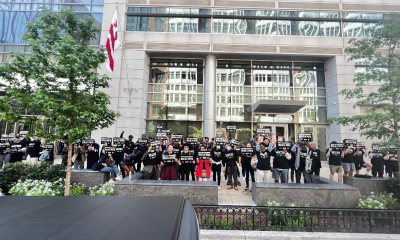#NNPA BlackPress
COMMENTARY: Are Blacks Close to Receiving Reparations?
NNPA NEWSWIRE — From a historical perspective, approximately 4,000,000 Africans and their descendants were enslaved in the U.S. and colonies that became the U.S. from 1619 to 1865. The institution of slavery was constitutionally and statutorily sanctioned by the U.S. from 1789 through 1865.
By Jeffrey L. Boney, NNPA Political Analyst
Blacks have been trying to level the economic and societal playing fields in this country for some time. When it comes to the concept of granting “reparations” to Black people as a form of restitution for the years that Blacks spent subjected to the barbaric institution of slavery in America, it has seemingly been overlooked and ignored by the majority of legislators that have come and gone in the U.S. Congress.
Many Blacks have heard and even used the phrase, “40 acres and a mule,” which was a guarantee made to formerly enslaved people of African descent that was the first attempt at seeking to provide some form of reparations to Blacks who had been enslaved.
Of course, history shows us that the decision makers who talked about the idea of providing reparations to people of African descent who were previously enslaved, reneged on their promise, leaving Blacks to work harder and longer to achieve success than those who had enslaved them to begin with. This has proven to be extremely challenging for Blacks.
U.S. history has set precedent for providing reparations to several groups, including Japanese Americans, who have suffered challenges.
In 1942, during World War II, the U.S. created internment camps where roughly 125,000 people of Japanese descent were essentially enslaved as a result of an executive order from then-president Franklin Delano Roosevelt. The rationale for their inhumane detention was that people of Japanese descent were suspected to have been conspiring against the U.S.
Sadly, many of these people were American citizens, but that did not matter because they were forcibly detained and made to move from their homes to the internment camps.
Congress decided to institute a reparation fund after recognizing the actions of the U.S. government resulted in estimated losses of several billion dollars sustained due to the loss of property and the ability to make a living suffered by those of Japanese descent.
As a result, each survivor was eventually awarded $20,000, with approximately 80,000 people of Japanese descent claiming the reparations that they were entitled to.
This action cost the U.S. government approximately $1.6 billion in reparations and remains a dark stain on America’s history.
Here in America, descendants of the people of African descent that were enslaved and experienced some of the cruelest ordeals imaginable, should be looked upon no differently than any other group. As with Japanese Americans during and after World War II, African Americans continue to experience their own unique challenges and issues.
From a historical perspective, approximately 4,000,000 Africans and their descendants were enslaved in the U.S. and colonies that became the U.S. from 1619 to 1865. The institution of slavery was constitutionally and statutorily sanctioned by the U.S. from 1789 through 1865.
African Americans continue to suffer debilitating economic, educational, and health hardships, including but not limited to the nearly 1,000,000 Black people incarcerated, an unemployment rate that is more than twice the current unemployment rate of Whites, and an average wealth of less than 1⁄16 of that of White families, a disparity which has worsened, not improved, over time.
While the focus has been on highlighting the social effects of slavery and segregation, the continuing economic implications remain largely ignored by mainstream analysis. These economic issues are the root cause of many critical issues in the African American community today, such as education, healthcare and criminal justice policy, including policing practices.
The call for reparations represents a commitment to enter a constructive dialogue on the role of slavery and racism in shaping present-day conditions in our community and American society.
Former U.S. Congressman John Conyers Jr. (D-MI) once proposed creating a Commission to study how to appropriately compensate the descendants of slaves for decades, with those conversations falling on deaf ears.
Understanding the unique challenges that African Americans face here in America, U.S. Congresswoman Sheila Jackson Lee (D-TX) is hoping that a bill she is now championing, in the spirit of former Rep. Conyers, gets the level of support and traction needed to help African Americans finally receive the guarantee promised to them back in the late 1800s.
Congresswoman Jackson Lee recently introduced H.R. 40, a bill to establish a Commission to Study and Develop Reparations Proposals for African Americans Act. This piece of legislation would create a Commission aimed at studying the impact of slavery and continuing discrimination against African Americans, resulting directly and indirectly from slavery to segregation to the desegregation process and the present day.
The Commission would also make recommendations concerning any form of apology and compensation to begin the long-delayed process of atonement for slavery.
“The impact of slavery and its vestiges continues to affect African Americans and indeed all Americans in communities throughout our nation, which is why I am pleased to introduce H.R. 40,” said Congresswoman Lee. “This legislation is intended to examine the institution of slavery in the colonies and the United States from 1619 to the present, and further recommend appropriate remedies.”
Congresswoman Jackson Lee states that since the initial introduction of this legislation, its proponents have made substantial progress in elevating the discussion of reparations and reparatory justice at the national level, joining the mainstream international debate on the issue.
She went on to state that some people have tried to deflect the importance of these conversations by focusing on individual monetary compensation, but the real issue is whether and how this nation can come to grips with the legacy of slavery that still infects current society.
According to the bill, the Commission shall be composed of 13 members, who shall be appointed, within 90 days after the date of enactment of this Act, as follows:
- Three members shall be appointed by the President.
- Three members shall be appointed by the Speaker of the House of Representatives.
- One member shall be appointed by the President pro tempore of the Senate.
- Six members shall be selected from the major civil society and reparations organizations that have historically championed the cause of reparatory justice.
In short, the Commission would be tasked with studying the impact of slavery and the continuing discrimination against African Americans, which has come as a direct and indirect result of slavery, as well as from segregation and other present-day factors.
According to the bill, the Commission would also make recommendations concerning any form of apology and compensation to begin the long-delayed process of atonement for slavery.
Congresswoman Jackson Lee believes that through legislation, resolutions, news, and litigation, Congress is moving closer to making strides towards reparations.
Congresswoman Jackson Lee points out that despite the progress that has been made in this country, including the election of the first American President of African descent, the legacy of slavery still lingers heavily in this nation.
She believes this bill, which seeks to establish a Commission to examine the moral and social implications of slavery, is both relevant and crucial to restoring trust in governmental institutions in many communities, especially during a time where there are many reoccurring issues affecting African Americans in ways that are different from other communities.
“Today there are more people at the table — more activists, more scholars, more CEO’s, more state and local officials, and more Members of Congress,” said Congresswoman Jackson Lee. “I believe that H.R. 40 is a crucial piece of legislation because it goes beyond exploring the economic implications of slavery and segregation. Though the times and circumstances may change, the principle problem of slavery continues to weigh heavily on this country. A federal commission can help us reach into this dark past and bring us into a brighter future.”
Surprisingly, the topic of reparations for slavery for African Americans has intensified, with several Democratic presidential candidates, including Sen. Cory Booker, Sen. Kamala Harris, former San Antonio Mayor Julian Castro, Sen. Elizabeth Warren and former Rep. Beto O’ Rourke, each voicing their support for reparations, supporting Rep. Jackson Lee’s bill.
The National Newspaper Publishers Association (NNPA), which represents over 200 Black-owned media companies across the U.S., will continue to follow this extremely important legislation and the discussions surrounding this pertinent issue concerning people of African descent all across this country.
Jeffrey L. Boney is a political analyst and international correspondent for the NNPA Newswire and BlackPressUSA.com and serves as Associate Editor for the Houston Forward Times newspaper. Jeffrey is an award-winning journalist, dynamic international speaker, experienced entrepreneur, business development strategist and founder and CEO of the Texas Business Alliance. Follow Jeffrey on Twitter @realtalkjunkies
#NNPA BlackPress
Beloved Actor and Activist Louis Cameron Gossett Jr. Dies at 87
NNPA NEWSWIRE — Louis Gossett Jr., the groundbreaking actor whose career spanned over five decades and who became the first Black actor to win an Academy Award as Best Supporting Actor for his memorable role in “An Officer and a Gentleman,” has died. Gossett, who was born on May 27, 1936, in Brooklyn, N.Y., was 87. Recognized early on for his resilience and nearly unmatched determination, Gossett arrived in Los Angeles in 1967 after a stint on Broadway.
The post Beloved Actor and Activist Louis Cameron Gossett Jr. Dies at 87 first appeared on BlackPressUSA.

By Stacy M. Brown
NNPA Newswire Senior National Correspondent
@StacyBrownMedia
Louis Gossett Jr., the groundbreaking actor whose career spanned over five decades and who became the first Black actor to win an Academy Award as Best Supporting Actor for his memorable role in “An Officer and a Gentleman,” has died. Gossett, who was born on May 27, 1936, in Brooklyn, N.Y., was 87. Recognized early on for his resilience and nearly unmatched determination, Gossett arrived in Los Angeles in 1967 after a stint on Broadway.
He sometimes spoke of being pulled over by law enforcement en route to Beverly Hills, once being handcuffed to a tree, which he remembered as a jarring introduction to the racial tensions of Hollywood. In his memoir “An Actor and a Gentleman,” Gossett recounted the ordeal, noting the challenges faced by Black artists in the industry. Despite the hurdles, Gossett’s talent shone brightly, earning him acclaim in groundbreaking productions such as “A Raisin in the Sun” alongside Sidney Poitier. His Emmy-winning portrayal of Fiddler in “Roots” solidified his status as a trailblazer, navigating a landscape fraught with racial prejudice.
According to the HistoryMakers, which interviewed him in 2005, Gossett’s journey into the limelight began during his formative years at PS 135 and Mark Twain Junior High School, where he demonstrated early leadership as the student body president. His passion for the arts blossomed when he starred in a “You Can’t Take It With You” production at Abraham Lincoln High School, catching the attention of talent scouts who propelled him onto Broadway’s stage in “Take A Giant Step.” His stellar performance earned him the prestigious Donaldson Award for Best Newcomer to Theatre in 1952. Though initially drawn to sports, Gossett’s towering 6’4” frame and athletic prowess led him to receive a basketball scholarship at New York University. Despite being drafted by the New York Knicks in 1958, Gossett pursued his love for acting, honing his craft at The Actors Studio under the tutelage of luminaries like John Sticks and Peggy Fury.
In 1961, Gossett’s talent caught the eye of Broadway directors, leading to roles in acclaimed productions such as “Raisin in the Sun” and “The Blacks,” alongside legends like James Earl Jones, Cicely Tyson, Roscoe Lee Brown, and Maya Angelou. Transitioning seamlessly to television, Gossett graced small screens with appearances in notable shows like “The Bush Baby” and “Companions in Nightmare.” Gossett’s silver screen breakthrough came with his role in “The Landlord,” paving the way for a prolific filmography that spanned over 50 movies and hundreds of television shows. From “Skin Game” to “Lackawanna Blues,” Gossett captivated audiences with his commanding presence and versatile performances.
However, his portrayal of “Fiddler” in Alex Haley’s groundbreaking miniseries “Roots” earned Gossett critical acclaim, including an Emmy Award. The HistoryMakers noted that his golden touch extended to the big screen, where his role as Sergeant Emil Foley in “An Officer and a Gentleman” earned him an Academy Award for Best Supporting Actor, making him a trailblazer in Hollywood history.
Beyond the glitz and glamour of Hollywood, Gossett was deeply committed to community activism. In 1964, he co-founded a theater group for troubled youth alongside James Earl Jones and Paul Sorvino, setting the stage for his lifelong dedication to mentoring and inspiring the next generation. Gossett’s tireless advocacy for racial equality culminated in the establishment of Eracism, a nonprofit organization dedicated to combating racism both domestically and abroad. Throughout his illustrious career, Gossett remained a beacon of strength and resilience, using his platform to uplift marginalized voices and champion social change. Gossett is survived by his children, Satie and Sharron.
The post Beloved Actor and Activist Louis Cameron Gossett Jr. Dies at 87 first appeared on BlackPressUSA.
#NNPA BlackPress
COMMENTARY: D.C. Crime Bill Fails to Address Root Causes of Violence and Incarceration
WASHINGTON INFORMER — The D.C. crime bill and so many others like it are reminiscent of the ‘94 crime bill, which produced new and harsher criminal sentences, helped deploy thousands of police and surveilling methods in Black and brown communities, and incentivized more states to build prisons through a massive infusion of federal funding. While it is not at the root of mass incarceration, it significantly accelerated it, forcing a generation of Black and brown families into a never-ending cycle of state-sanctioned violence and incarceration.
The post COMMENTARY: D.C. Crime Bill Fails to Address Root Causes of Violence and Incarceration first appeared on BlackPressUSA.

By Kaili Moss and Jillian Burford | Washington Informer
Mayor Bowser has signed the “Secure DC” omnibus bill passed by the D.C. Council last month. But we already know that this bill will be disastrous for all of D.C., especially for Black and brown residents.
While proponents claim that this legislation “will make D.C. residents safer and more secure,” it actually does nothing to address the root of the harm in the first place and instead maintains a cycle of violence, poverty, and broken community ties. The omnibus bill calls for increased surveillance, drug-free zones, and will expand pre-trial detention that will incarcerate people at a significantly higher rate and for an indeterminate amount of time before they are even tried. This bill will roll back decades of nationwide policy reform efforts and initiatives to keep our communities safe and whole, which is completely contradictory to what the “Secure” D.C. bill claims it will do.
What is unfolding in Washington, D.C., is part of a dangerous national trend. We have seen a resurrection of bad crime bills in several jurisdictions across the country — a phenomenon policy experts have named “zombie laws,” which are ineffective, costly, dangerous for communities of color and, most importantly, will not create public safety. Throwing more money into policing while failing to fund preventative measures does not keep us safe.
The D.C. crime bill and so many others like it are reminiscent of the ‘94 crime bill, which produced new and harsher criminal sentences, helped deploy thousands of police and surveilling methods in Black and brown communities, and incentivized more states to build prisons through a massive infusion of federal funding. While it is not at the root of mass incarceration, it significantly accelerated it, forcing a generation of Black and brown families into a never-ending cycle of state-sanctioned violence and incarceration. Thirty years later, despite spending billions each year to enforce these policies with many of these provisions remaining in effect, it has done very little to create long-term preventative solutions. Instead, it placed a permanent moving target on the backs of Black people, and the D.C. crime bill will do the same.
The bill calls for more pretrial detention. When our loved ones are held on pretrial detention, they are held on the presumption of guilt for an indeterminate amount of time before ever seeing a judge, which can destabilize people and their families. According to experts at the Malcolm Weimer Center for Social Policy at Harvard University, just one day in jail can have “devastating consequences.” On any given day, approximately 750,000 people are held in jails across the nation — a number that beats our nation’s capital population by about 100,000. Once detained, people run the risk of losing wages, jobs, housing, mental and health treatments, and time with their families. Studies show that pretrial detention of even a couple of days makes it more likely for that person to be rearrested.
The bill also endangers people by continuing a misguided and dangerous War on Drugs, which will not get drugs off the street, nor will it deter drug use and subsequent substance use disorders (SUDs). Drug policies are a matter of public health and should be treated as such. Many states such as Alabama, Iowa and Wisconsin are treating the current fentanyl crisis as “Crack 2.0,” reintroducing a litany of failed policies that have sent millions to jails and prisons instead of prioritizing harm reduction. Instead, we propose a simple solution: listen to members of the affected communities. Through the Decrim Poverty D.C. Coalition, community members, policy experts and other stakeholders formed a campaign to decriminalize drugs and propose comprehensive legislation to do so.
While there are many concerning provisions within the omnibus bill, car chases pose a direct physical threat to our community members. In July 2023, NBC4 reported that the D.C. Council approved emergency legislation that gave MPD officers the ability to engage in vehicular pursuits with so-called “limited circumstances.” Sgt. Val Barnes, the head of MPD’s carjacking task force, even expressed concern months before the decision, saying, “The department has a pretty strict no-chase policy, and obviously for an urban setting and a major metropolitan city, that’s understandable.” If our law enforcement officers themselves are operating with more concern than our elected officials, what does it say about the omnibus bill’s purported intention to keep us safe?
And what does it mean when the risk of bodily harm is posed by the pursuit itself? On Saturday, Feb. 10, an Eckington resident had a near-miss as a stolen car barreled towards her and her dog on the sidewalk with an MPD officer in pursuit. What responsibility does the city hold if this bystander was hit? What does restitution look like? Why are our elected officials pushing for MPD officers to contradict their own policies?
Just a few summers ago during the uprisings of 2020, we saw a shift in public perspectives on policing and led to legislation aimed at limiting police power after the highly-publicized murders of loved ones Breonna Taylor and George Floyd — both victims of War on Drugs policing and the powers gained from the ’94 crime bill. And yet here we are. These measures do not keep us safe and further endanger the health of our communities. Studies show that communities that focus on harm reduction and improving material conditions have a greater impact on public safety and community health. What’s missing in mainstream conversations about violent crime is the violence that stems from state institutions and structures that perpetuate racial and class inequality. The people of D.C. deserve to feel safe, and that includes feeling safe from the harms enacted by the police.
Kaili Moss is a staff attorney at Advancement Project, a national racial justice and legal organization, and Jillian Burford is a policy organizer at Harriet’s Wildest Dreams.
The post COMMENTARY: D.C. Crime Bill Fails to Address Root Causes of Violence and Incarceration first appeared on BlackPressUSA.
#NNPA BlackPress
Mayor, City Council President React to May 31 Closing of Birmingham-Southern College
THE BIRMINGHAM TIMES — “This is a tragic day for the college, our students, our employees, and our alumni, and an outcome so many have worked tirelessly to prevent,” Rev. Keith Thompson, chairman of the BSC Board of Trustees said in an announcement to alumni. “We understand the devastating impact this has on each of you, and we will now direct our efforts toward ensuring the smoothest possible transition for everyone involved.”
The post Mayor, City Council President React to May 31 Closing of Birmingham-Southern College first appeared on BlackPressUSA.

By Barnett Wright | The Birmingham Times
Birmingham-Southern College will close on May 31, after more than a century as one of the city’s most respected institutions.
“This is a tragic day for the college, our students, our employees, and our alumni, and an outcome so many have worked tirelessly to prevent,” Rev. Keith Thompson, chairman of the BSC Board of Trustees said in an announcement to alumni. “We understand the devastating impact this has on each of you, and we will now direct our efforts toward ensuring the smoothest possible transition for everyone involved.”
There are approximately 700 students enrolled at BSC this semester.
“Word of the decision to close Birmingham Southern College is disappointing and heartbreaking to all of us who recognize it as a stalwart of our community,” Birmingham Mayor Randall Woodfin said in a statement. “I’ve stood alongside members of our City Council to protect this institution and its proud legacy of shaping leaders. It’s frustrating that those values were not shared by lawmakers in Montgomery.”
Birmingham City Council President Darrell O’Quinn said news of the closing was “devastating” on multiple levels.
“This is devastating for the students, faculty members, families and everyone affiliated with this historic institution of higher learning,” he said. “It’s also profoundly distressing for the surrounding community, who will now be living in close proximity to an empty college campus. As we’ve seen with other institutions that have shuttered their doors, we will be entering a difficult chapter following this unfortunate development … We’re approaching this with resilience and a sense of hope that something positive can eventually come from this troubling chapter.”
The school first started as the merger of Southern University and Birmingham College in 1918.
The announcement comes over a year after BSC officials admitted the institution was $38 million in debt. Looking to the Alabama Legislature for help, BSC did not receive any assistance.
This past legislative session, Sen. Jabo Waggoner sponsored a bill to extend a loan to BSC. However, the bill subsequently died on the floor.
Notable BSC alumni include former New York Times editor-in-chief Howell Raines, former U.S. Sen. Howell Heflin and former Alabama Supreme Court Chief Justice Perry O. Hooper Sr.
This story will be updated.
The post Mayor, City Council President React to May 31 Closing of Birmingham-Southern College first appeared on BlackPressUSA.
-

 Activism4 weeks ago
Activism4 weeks agoOakland Post: Week of March 20 – 26, 2024
-

 #NNPA BlackPress3 weeks ago
#NNPA BlackPress3 weeks agoCOMMENTARY: D.C. Crime Bill Fails to Address Root Causes of Violence and Incarceration
-

 #NNPA BlackPress4 weeks ago
#NNPA BlackPress4 weeks agoFrom Raids to Revelations: The Dark Turn in Sean ‘Diddy’ Combs’ Saga
-

 #NNPA BlackPress3 weeks ago
#NNPA BlackPress3 weeks agoMayor, City Council President React to May 31 Closing of Birmingham-Southern College
-

 #NNPA BlackPress4 weeks ago
#NNPA BlackPress4 weeks agoCOMMENTARY: Lady Day and The Lights!
-

 Activism3 weeks ago
Activism3 weeks agoOakland Post: Week of March 27 – April 2, 2024
-

 #NNPA BlackPress4 weeks ago
#NNPA BlackPress4 weeks agoBaltimore Key Bridge Catastrophe: A City’s Heartbreak and a Nation’s Alarm
-

 #NNPA BlackPress4 weeks ago
#NNPA BlackPress4 weeks agoBaltimore’s Key Bridge Struck by Ship, Collapses into Water




















































